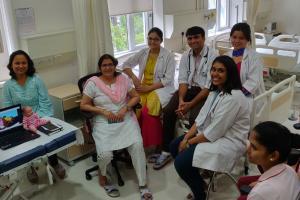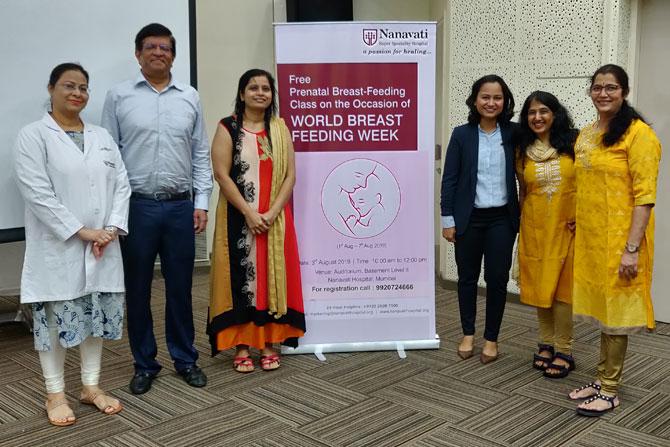BFHI by Nanavati Hospital was launched by the World Health Organisation and UNICEF (United Nations Children's Fund) in 1991, to implement practice that protects, promotes and supports breastfeeding

Doctors at Nanavati Hospital
Nanavati Super Speciality Hospital (NSSH) has become one of the first hospitals in Mumbai to successfully implement a Baby-Friendly Hospital Initiative (BFHI). Under the initiative, 71 per cent children born at the hospital during June-July received their mother’s milk—ideal first feed which provides lifelong immunity against the diseases boosts growth and tissue repair factors within the 'Golden Hour,' of childbirth. BFHI was launched by the World Health Organisation and UNICEF (United Nations Children's Fund) in 1991, to implement practice that protects, promotes and supports breastfeeding. The BFHI revolution at NSSH started with the medical administration taking active efforts to study existing breastfeeding practices.
ADVERTISEMENT
"We conducted an audit of our 'Birthing unit,' to understand constraints, bottlenecks and current beliefs or practices. The audit report findings suggested the need for counselling and training for expectant mothers during the antenatal period. We helped the mothers prepare physically and mentally to breastfeed their babies post-delivery and experience it as precious bonding moments with their baby," said Dr Ashwini Jogade, medical superintendent of NSSH.
While the early breastfeeding rate of NSSH from January to May was about 17 per cent between June to July the rate grew to 71 per cent. All the 56 childbirths, through vaginal and caesarean deliveries were strictly followed by skin-to-skin contact of mother and child and breastfeeding initiation.
Dr Gayatri Deshpande, consultant, gynaecology & obstetrics, NSSH said the two most integral part of the initiative at NSSH were early breastfeeding initiation (breastfeeding initiation within the first hour of birth) and exclusive breastfeeding (giving the child only breast milk exclusively for first six months). First milk of the mother, known as 'colostrum,' provides the child with IgA antibodies that prevent them with infections. The milk is also rich in Vitamin D, which is essential for the absorption of calcium and the prevention of rickets (skeletal disorder) in children. Most importantly, the skin-to-skin contact prevents the child from hyperthermia and increases bonding between the mother and child. "Cases, where we couldn't initiate breastfeeding, were those, where either mother or the child needed immediate medical attention and couldn't physically be together," said Dr Deshpande, who spearheaded the program along with Dr Jui Shinde-Patil, Lactation counsellor of NSSH.
 Doctors at Nanavati Hospital
Doctors at Nanavati Hospital
Dr Deshpande added that though the hospital has been implementing BFHI, result-driven implementation meant the entire, Birthing Unit, including nurses, resident doctors, gynaecologists, paediatricians and support staff of labour room and wards to work with a single objective. "We sensitised all staff members through seminars, talks and workshops about the importance of early initiation of breastfeeding and how it is lifesaving for both mother and child," said Dr Deshpande.
All the mothers, visiting the hospital during their time of pregnancy, were included in antenatal counselling programs where they were taught about the importance and management of breastfeeding along with commonly faced complications and how to resolve them.
"Most importantly, we completely discouraged mothers from using any commercially available baby foods for at-least the first six months. A few of our patients had twins and after counselling, despite the practical difficulties, continued to breastfeed them exclusively for six months," said Dr Shinde.
Due to the counselling by Dr Shinde, as compared to 51 per cent babies who received formula feed as their first meal during January to May, only 7 per cent babies were fed formula feed during June-July. Even in caesarean deliveries, the team preferred to give local anaesthesia to the mothers rather than general anaesthesia to ensure mothers are conscious post the childbirth. "We created a screen to provide a private and secure space for the mothers while the doctors continued their post-childbirth surgical interventions. Nurses helped the mothers throughout the procedure and ensured the child is provided with the nutrient-rich first feed," said Dr Shinde.
Now after two months, almost every baby born at the hospital is breastfed within the first 60-90 minutes of birth and spends at least 25-30 minutes of skin-to-skin contact with their mothers. “These simple practices will lead to lifelong immunity to babies and their mothers as breastfeeding also protects mothers from cancers of breast and cervix. It also keeps the women physically fit as there is a constant calorie consumption,” said Dr Deshpande.
The hospital is now aiming to achieve over 80 per cent rate in the skin to skin contact between mother and child, early initiation of breastfeeding, and exclusive breastfeeding for first six months to comply with the WHO guidelines and set a benchmark in child-mother health.
Catch up on all the latest Crime, National, International and Hatke news here. Also download the new mid-day Android and iOS apps to get latest updates
 Subscribe today by clicking the link and stay updated with the latest news!" Click here!
Subscribe today by clicking the link and stay updated with the latest news!" Click here!






